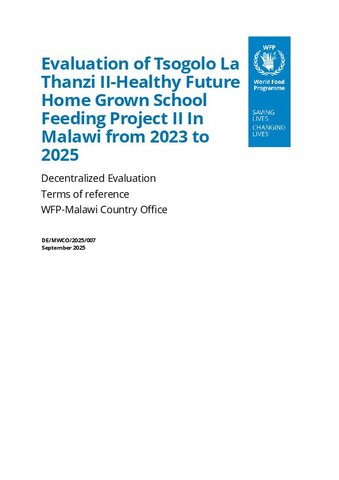
The evaluation aims to assess performance, generate learning, and inform future school feeding strategies. It builds on lessons from TSOLATA I and supports Malawi’s goal of universal school feeding by 2030.
Subject and scope
TSOLATA II targets 416,000 primary and 13,000 preschool learners across seven districts, while engaging 20,000 smallholder farmers. It promotes inclusive access to nutritious meals, strengthens local food systems, and enhances national ownership of school feeding. The evaluation covers implementation from September 2023 to October 2025, focusing on nutrition-sensitive interventions, agricultural linkages, and education outcomes.
Key evaluation questions:
The evaluation will explore:
- To what extent did the TSOLATA II HGSF relevant to the needs of the target population and the national policy context, including its responsiveness to evolving humanitarian challenges?
- To what extent does the TSOLATA II HGSF programme align with other interventions implemented by WFP (programme integration), the Government and other stakeholders?
- To what extent did TSOLATA II achieve its intended objectives and results, and where there any variations in outcomes among different groups, including men, women, girls and boys and people with disabilities?
- To what extent did TSOLATA II utilise resources (financial, human, and time) efficiently to deliver its planned outputs and outcomes?
- To what extent has TSOLATA II led to broader changes, positive or negative, intended or unintended?
- To what extent are the activities supported by TSOLATA II likely to be sustained beyond the project’s duration?
Methodology
The evaluation adopts a mixed-methods approach, guided by OECD-DAC criteria and WFP standards. It emphasizes learning and accountability, with attention to gender equality, inclusion, and participation of affected populations. Ethical considerations, quality assurance, and stakeholder engagement are central. The evaluation will triangulate qualitative and quantitative data, including field visits, interviews, and document reviews.
Key users and stakeholders
Primary users include:
- WFP Malawi country office – for programme improvement and strategic planning
- WFP field offices and ESARO – for operational insights and regional learning
- Government ministries – Education, Agriculture, Health – for alignment and sustainability
- Donor – for accountability and strategic relevance
- Beneficiaries – whose perspectives will inform programme responsiveness
- WFP HQ and Office of evaluation – for corporate learning and policy refinement
- UN agencies – for harmonized programming and joint initiatives
The evaluation will also engage district councils, implementing partners, and community stakeholders to ensure inclusive and actionable findings.
